PolicyLab Forum 2022: That’s a Wrap!
Three years in the making and one and a half days of in-person sessions and networking later, I’m happy to report that PolicyLab Forum 2022 was a great success! As the event director, I’m excited to share a recap with our blog readers of who was there, what we covered and my personal favorite part of the forum.
In planning our second children’s health policy and practice forum, we set out to host solutions-oriented discussions on how we can bridge research, policy, and practice to create long-term, meaningful change for children and families as we recover from and move beyond the pandemic. Donning our masks, the reality that COVID-19 still lingers hung over our heads, but we were determined that these conversations needed to happen (safely) in person so we can move beyond the immediate public health crisis to build new partnerships and refocus on the future health and well-being of children.

The Kimmel Center for the Performing Arts in Philadelphia, the site of PolicyLab Forum 2022.
Who We Brought Together
As hoped, we drew a diverse crowd of nearly 250 child health experts representing policymakers, program developers, public health professionals, providers, child health advocates and researchers. They came to Philadelphia from 16 states and Washington, D.C. To call out a few, we were joined by several members of Pennsylvania Governor Tom Wolf’s policy team, representatives from foundations focused on children’s mental health and education, and eight student scholarship recipients studying social work, medicine, psychiatry and public health. Many PolicyLab researchers also participated as speakers and attendees, sharing their data-driven insights.
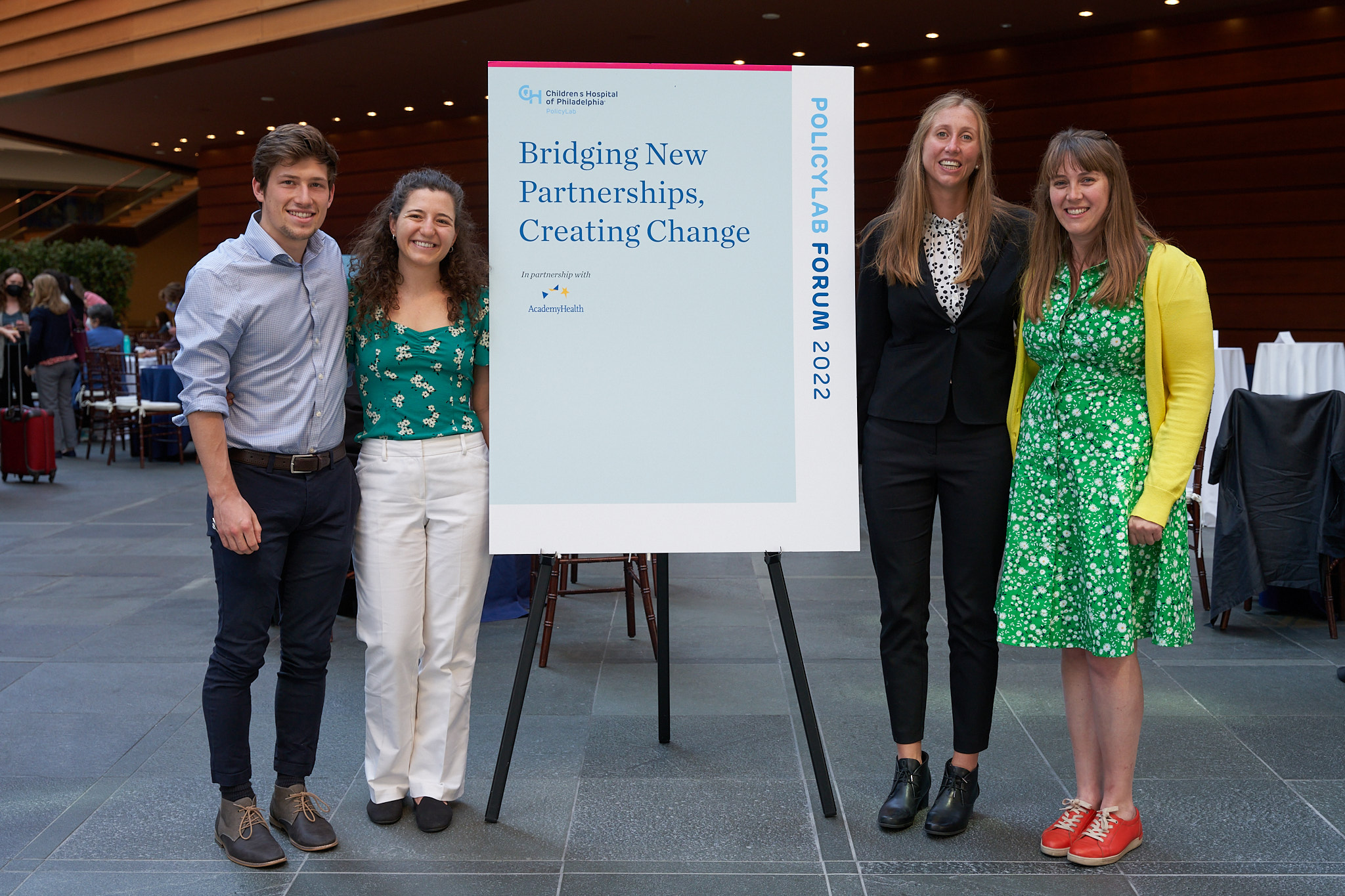
Pictured above are four of the eight student scholarship recipients.
These distinct perspectives not only informed the direction of the conversations held throughout the event but consistently led us back to discussions of how to effectively collaborate when it comes to successfully addressing the multifaceted challenges facing children, teens and families today. Leading those dialogues were some terrific speakers, including the CEO and president of March of Dimes, the nation’s leading organization focused on moms and babies, Stacey D. Stewart, superintendents representing the geographically diverse places of Philadelphia and Guilford County, North Carolina, experts such as Dr. Lee Beers who are designing evidence-based models to better integrate behavioral and physical health services for kids, and policymakers like Pennsylvania State Rep. Morgan Cephas who are writing and championing policies to address maternal mental health.
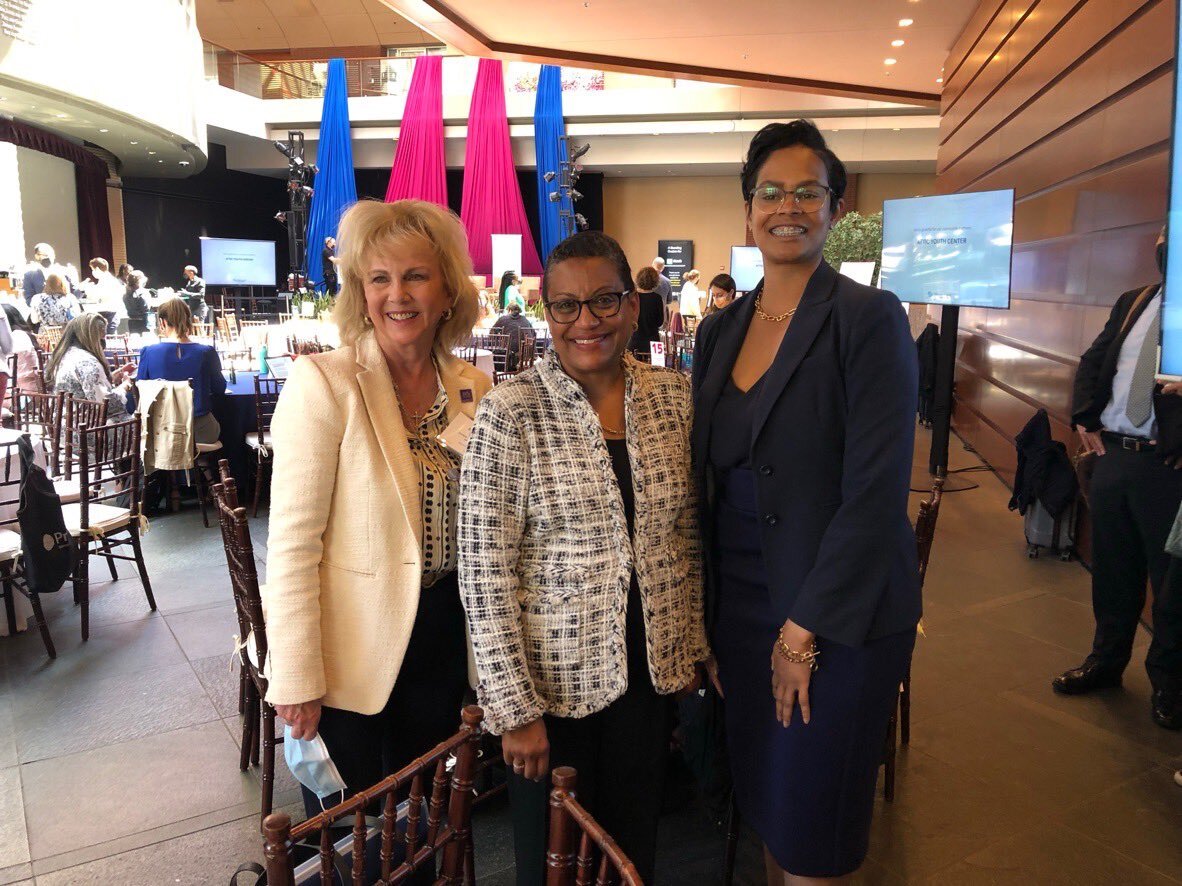
The picture above features Stacey D. Stewart (middle) and State Rep. Morgan Cephas (right).
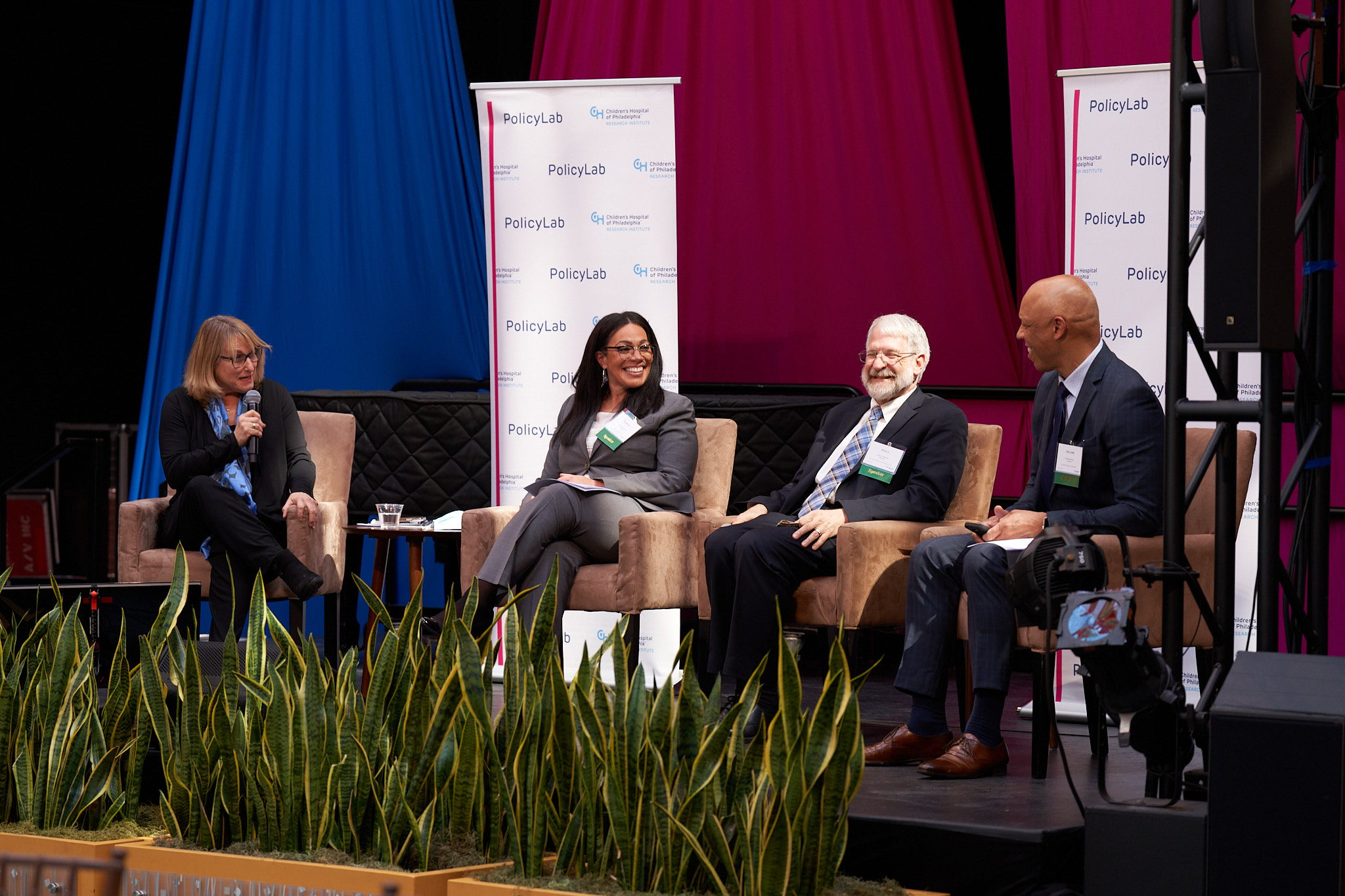
Pictured above is our "Cross-sector Partnerships to Support Schools in COVID-19 Recovery and Beyond: The Vision from Education Leaders" panel.
Pictured left to right: Valerie Strauss, education writer at The Washington Post; Dr. Sharon Contreras, superintendent of Guilford County North Carolina Schools; Paolo DeMaria, president and CEO of the National Association of State Boards of Education; and Dr. William Hite, Jr., superintendent of the School District of Philadelphia.
Session Highlights
When I wasn’t running around the Kimmel Center with my colleagues working on event operations, I had the pleasure of being a participant myself in some of the excellent sessions our team organized.
One such session was the plenary focused on the growing crisis of underinsurance among our nation’s children. Through the perspectives of an epidemiologist studying trends in this phenomenon, a state policymaker dedicated to ensuring all kids in New Jersey can access the care they need, and a long-time children’s health coverage advocate working to build partnerships around strategies for improving the quality and affordability of health care, this session highlighted specific state-based solutions that could reduce the cost burden to employers for providing robust health insurance benefits to families. Two specific challenges they agreed need to be addressed: 1) better, high-value networks for children and their caregivers that require timely appointment availability and 2) behavioral health benefits.
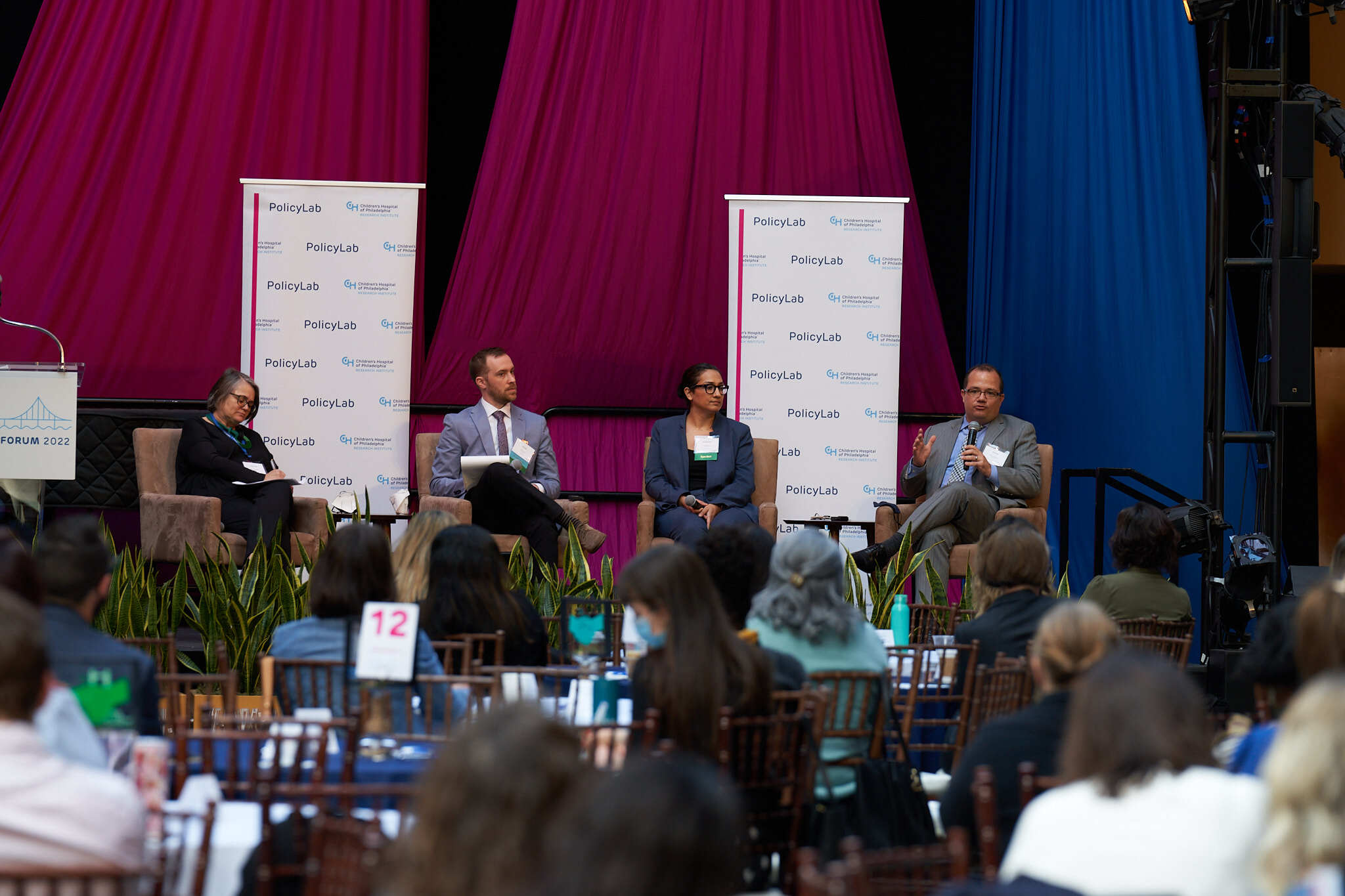
Pictured above is our "Addressing the Crisis of Underinsurance for Children and Families" panel.
Pictured from left to right: Heather Howard, director of State Health and Value Strategies; Doug Strane, health policy research program manager at PolicyLab; Shabnam Salih, director of the Office of Health Care Affordability and Transparency in the New Jersey Governor’s Office; and Shawn Gremminger, director of health policy at the Reservoir Communications Group
Another session I greatly enjoyed was the breakout titled, “Focusing on Prevention to Increase Family Well-being.” Not only was the format engaging with the moderator holding conversations with a community-based program leader, a pediatrician providing care in Philadelphia’s most in-need communities, and an insurance provider committed to addressing social determinants of health, but the anecdotes the panel provided to illustrate why we should focus on prevention were incredibly powerful.
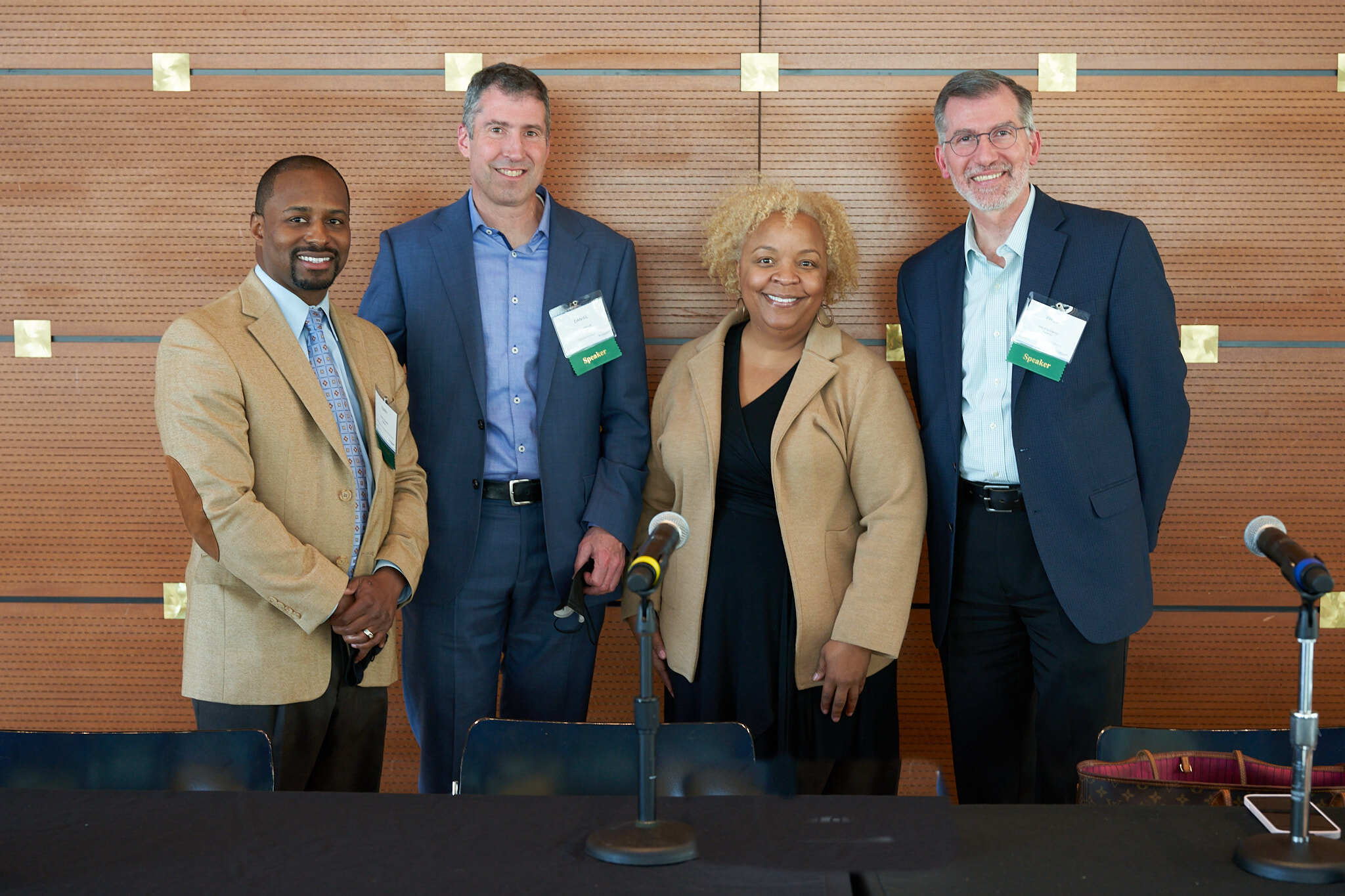
Pictured above is our "Focusing on Prevention to Increase Family Well-Being" panel.
Pictured from left to right: Corey Coleman, vice president of Community & Strategic Partnerships at UnitedHealthcare Community Plan of Pennsylvania; Dr. Dan Taylor, associate professor of pediatrics at Drexel University College of Medicine; Benita Miller, executive director of Powerful Families, Powerful Communities NJ; and Dr. Philip Scribano, section chief of Safe Place: Center for Child Protection and Health at Children's Hospital of Philadelphia (CHOP).
For example, Dr. Daniel Taylor recalled a meeting at the mayor’s office he participated in several years ago during which he shared data for how programs focused on maternal mental health, prenatal care, and addressing caregiver substance use could prevent gun violence down the line. Unfortunately, he was drowned out by another group that had a more immediate mission to teach community members how to make torniquets out of t-shirts to aid those who have been violently injured. While the policymakers’ attention quickly turned to the program that met an acute need, gun violence has only become more severe in Philadelphia in the years since that meeting, and the evidence has only grown to support programs like the ones that Dr. Taylor discussed in preventing that type of violence in the first place.
Outstanding Youth Awards Reception
My absolute favorite part of the forum was when we got to focus on the main subject of the event: the youth themselves.
Earlier this year, we put out a call for nominations across CHOP and through our local partners for Outstanding Youth Awards, which recognize exceptional children and teens in the Philadelphia region who contribute to improving the health and well-being of their peers and community through engagement in community-serving initiatives, research and/or policy. We ended up with a stack of nominations of some of the most incredible and dedicated youth, making the job of the nomination committee very difficult to select just three.
We announced the winners just before the event and invited them and their families to join us for an evening reception at the Kimmel Center. It was the highlight of the forum for many—and when you learn about our awardees, you’ll know why!
Alis Palillero is a 20-year-old from Philadelphia who serves as the survivor consultant for the Adolescent Protection Collaborative, CHOP’s specialized medical home for sex-trafficked youth. She also serves on the city of Philadelphia’s Juvenile Anti-Trafficking Coalition.
Rylie Brown is a 20-year-old from Williamstown, NJ, who has participated in the “Get Connected” and “Mapping Perceptions of PrEP Use in Trans Women” research studies at CHOP. Rylie also mentors other young transgender women involved in the studies.
Phillip Collier is a 15-year-old from Philadelphia who serves as the junior coach intern in the University of Pennsylvania’s Netter Center’s Cross-Grade Sports Leaders of Change Program. He and his peers deliver sports programming to K-8 students attending the Netter Center’s camps.
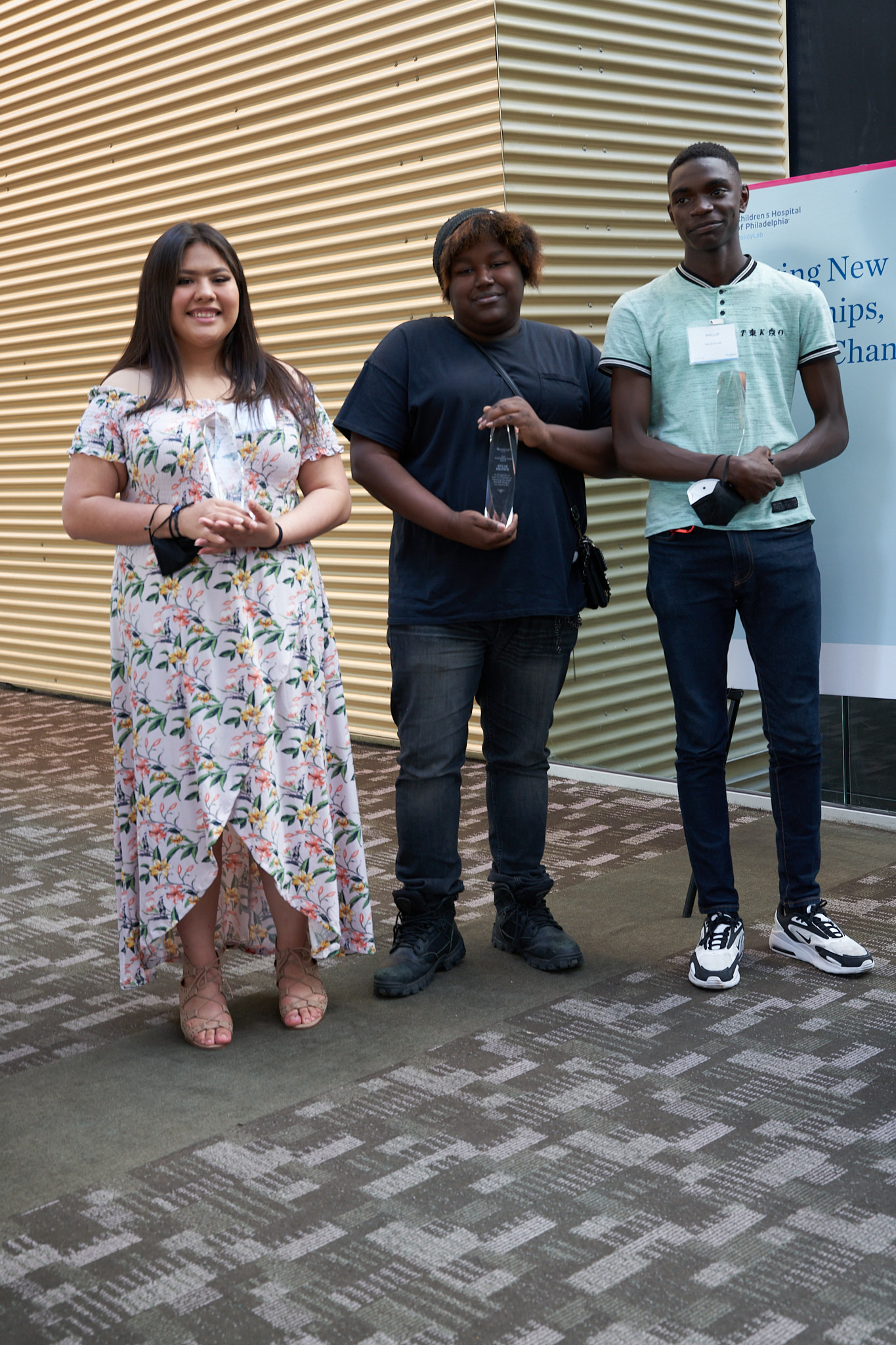
Pictured left to right: Alis Palillero, Rylie Brown, Phillip Collier
The awards reception was a refreshing reminder of why we do the work we do and how the next generation is filled with budding leaders who are going to make the world a better place. It left us feeling hopeful and optimistic.
That’s a Wrap
This event wouldn’t have been possible without the amazing supporters, content experts, and volunteers who helped fund, organize and run the event. We felt the momentum for action on many of the solutions discussed, as well as for future convenings that bridge research, policy, and practice to develop effective partnerships that can see forward those solutions. Thank you to all of our attendees, and let’s hope for many more in-person gatherings soon!
*Photos taken and provided by Gary Walens Photography.
Lauren Walens, MA, is a former strategic operations and communications director at PolicyLab.
